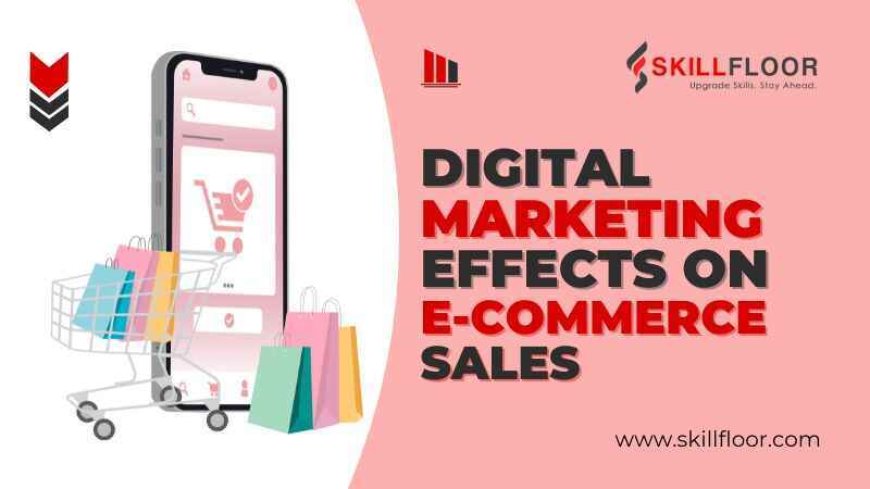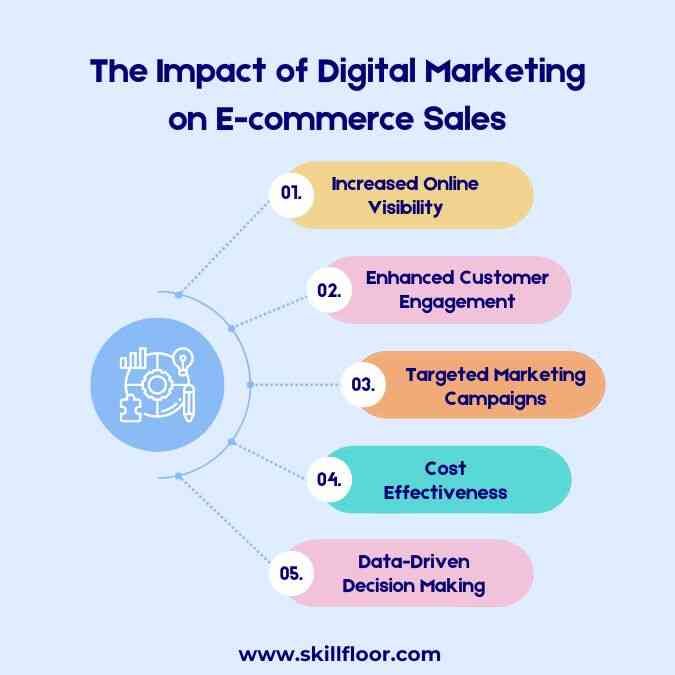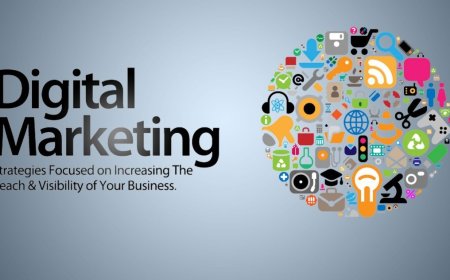The Effects of Digital Marketing on E-commerce Sales
Explore how digital marketing boosts e-commerce sales through SEO, social media, and email campaigns. Discover strategies to enhance online revenue.

The Effects of Digital Marketing on e-commerce sales have been notable in recent years. Businesses have seen real improvements in their online presence and customer reach by using strategies like search engine optimization (SEO), pay-per-click (PPC) advertising, social media marketing, and content marketing. These methods allow companies to target specific audiences, driving more website traffic effectively. As a result, the visibility and accessibility of e-commerce platforms have increased, leading to a rise in sales and revenue. Businesses can measure and tweak their digital marketing campaigns with various analytics tools for better results.
Another aspect of the Effects of Digital Marketing is its impact on customer engagement and retention. Tactics such as email marketing, personalized content, and influencer partnerships help build and maintain strong customer relationships. These approaches foster a sense of loyalty and trust, encouraging repeat purchases and positive word-of-mouth. Additionally, digital marketing offers cost-effective solutions compared to traditional marketing channels, often providing better returns on investment. As e-commerce keeps growing, the role of digital marketing in shaping consumer behavior and driving sales is becoming clearer, making it a key part of any successful online business strategy.
Key Components of Digital Marketing
-
Search Engine Optimization (SEO): SEO involves optimizing your website and content to rank higher in search engine results pages (SERPs). Higher visibility leads to increased organic traffic and potential sales.
-
Social Media Marketing: Platforms like Facebook, Instagram, and Twitter allow businesses to engage with their audience, build brand awareness, and drive traffic to their e-commerce sites.
-
Email Marketing: By sending targeted and personalized emails to potential and existing customers, businesses can nurture leads, promote products, and encourage repeat purchases.
-
Content Marketing: Creating valuable and relevant content helps attract and retain a clearly defined audience. This can include blog posts, videos, infographics, and more.
-
Pay-Per-Click (PPC) Advertising: PPC campaigns, such as Google Ads, allow businesses to bid on keywords and display ads to users searching for related products or services. This can drive immediate traffic and sales.
The Impact of Digital Marketing on E-commerce Sales
-
Increased Online Visibility
Digital marketing strategies, notably SEO and PPC, can greatly increase a company's online visibility. When e-commerce websites appear at the top of search results, they receive more hits and visits, resulting in increased conversion rates. A well-executed SEO plan may maintain a firm at the top of search results, resulting in consistent traffic flow.
-
Enhanced Customer Engagement
Social media marketing and content marketing are critical for increasing customer engagement. Businesses may establish a loyal client base by sharing valuable information and connecting with them on social media. Engaged customers are more likely to make repeat purchases and refer the brand to others, resulting in increased sales.
-
Targeted Marketing Campaigns
Digital marketing enables extremely focused efforts. Businesses may use tools like Google Analytics and Facebook Ads Manager to segment their audiences based on demographics, interests, and activity. This exact targeting guarantees that marketing efforts reach the most appropriate population, boosting the chances of conversion.
-
Cost-Effectiveness
Digital marketing is typically less expensive than traditional marketing strategies. PPC campaigns enable businesses to set budgets and pay only when people click on their advertisements. Furthermore, organic techniques such as SEO and content marketing take time and work but can produce long-term results without a large cash investment.
-
Data-Driven Decision Making
One of the most significant benefits of digital marketing is the capacity to collect and analyze data. Businesses may track the performance of their efforts in real-time, obtaining insight into what works and what does not. This data-driven strategy enables continual optimization, ensuring that marketing strategies constantly coincide with corporate objectives.

Strategies for Implementing Effective Digital Marketing
To fully leverage the benefits of digital marketing for e-commerce sales, businesses should consider the following strategies:
1. Invest in High-Quality Content
Content is the foundation of digital marketing. High-quality, interesting, and instructive content attracts visitors while also establishing trust and authority. Create blog pieces, videos, infographics, and social media updates that add value to your audience. Regularly update your material to keep it current and relevant.
2. Optimize for Mobile
With mobile devices accounting for a major amount of e-commerce traffic, it is critical to ensure that your website is mobile-friendly. A responsive design, quick loading speeds, and an intuitive mobile user experience can greatly boost your site's performance and sales.
3. Utilize Email Automation
Email automation can help you streamline your marketing activities and maintain timely communication with your customers. Create automated email sequences for abandoned carts, post-purchase follow-ups, and re-engagement initiatives. Personalize these emails to increase their efficacy and strengthen consumer relationships.
4. Leverage Social Proof
Customer reviews, testimonials, and user-generated content are all examples of social proof that can significantly impact purchasing decisions. Displaying favorable comments prominently on your website and social media channels can boost credibility and persuade potential clients to buy.
5. Run Targeted Ad Campaigns
Investing in targeted ad campaigns on platforms such as Google Ads and Facebook Ads might result in rapid traffic to your e-commerce website. Target your ideal customers based on their interests, behavior, and demographics. To maximize ROI, continuously evaluate and optimize your ad effectiveness.
6. Engage with Your Audience on Social Media
Active engagement on social media platforms contributes to the formation of a community around your brand. Respond to comments, texts, and mentions quickly. Use social media to promote contests, polls, and interactive material that encourages involvement and loyalty.
7. Implement Retargeting Campaigns
Retargeting efforts can help convert visitors who did not purchase their first visit. By showing advertising to these users when they explore other websites or social media, you may remind them of your products and encourage them to return and complete their purchase.
8. Analyze and Adjust Your Strategies
Analyze your digital marketing performance regularly with tools such as Google Analytics, social media insights, and email marketing analytics. Determine what works and what doesn't, then adapt your approach accordingly. Continuous optimization based on data insights is critical to long-term success.
Digital marketing has transformed the e-commerce industry, enabling businesses to reach larger audiences, engage customers, and increase revenues. E-commerce enterprises can improve their online presence and achieve long-term growth by implementing SEO, social media, email marketing, content marketing, and PPC advertising. Embracing digital marketing is no longer optional, but rather required for success in the competitive world of e-commerce.






























































